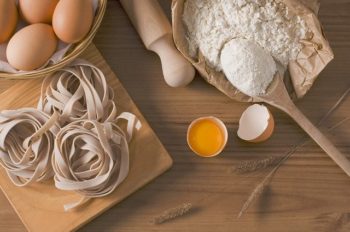Four Must-Know Hebrew Cooking Verbs Posted by Ayana on Sep 13, 2021 in Grammar, Vocabulary
Tishrei, the first month in the Hebrew calendar is always busy. It is full of festivals. Four holidays are observed in less than one month: Rosh Hashanah, Yom Kippur, Sukkot, and Simchat Torah. The Jewish New Year begins with Rosh Hashanah Seder – a big family dinner; Yom Kippur is actually a fast day, but the first meal after the fast is very important and is being prepared beforehand; the seven-day-festival of Sukkot has a custom of inviting guests every day of the festival. As you can understand, most of Tishrei is spent in the kitchen and around the dining table. So here are four daily verbs to use in the kitchen.
To cook לְבַשֵּׁל
לְבַשֵּׁל (pronounced as le-va-shel) means to cook, to prepare food in a hot liquid, usually water. A gas stove is common in Israeli houses, electric stoves became popular only in recent years. We cook rice, pasta and other grains, corn, cauliflower, broccoli and other vegetables, soup, stew, and so on. לְבַשֵּׁל is also used as a general verb to any dish, in the meaning of to prepare.
The root of the verb לְבַשֵּׁל is ב-ש-ל, and it belongs to binyan pi’el. It’s conjugated as follows:

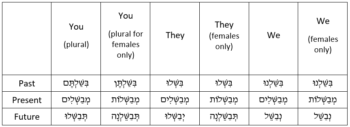
For example:
אֲנׅי מְבַשֵּׁל בַּבַּיִת אֶת הפחמימות: אֹורֶז, פַּסְטָה, בּוּרְגּוּל. אׅשְׁתּׅי מְבַשֶּׁלֶת אֶת הַתַּבְשִׁילׅים הַיּוֹתֵר מְסֻבָּכִים: יְרָקוֹת מְמוּלָּאִים, בָּשָׂר וְכַדּוֺמֶה.
I cook the carbs at home: rice, pasta, Bulgur. My wife cooks the more complicated dishes: stuffed vegetables, meat and the like.
To fry לְטַגֵּן
לְטַגֵּן (pronounced as le-ta-gen) means to fry, to cook food in a hot oil or other fat. Every Israeli house has a frying pan and a frying spatula. Israelis usually use canola oil for frying, but also olive oil, coconut oil, and butter. We fry omelets, cutlets, pancakes, latkes, jelly doughnuts, French fries, French toasts, and more.
The root of the verb לְטַגֵּן is ט-ג-נ, and it belongs to binyan pi’el. It’s conjugated as follows:

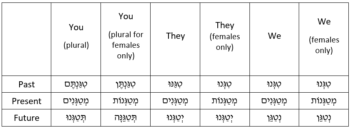
For example:
בְּמַהֲלָךְ הַשָּׁבוּעַ אֲנׅי אוֹכֵל קַל, בְּדֶרֶךְ כְּלָל מְטַגֵּן לׅי חֲבִיתָה וְחוֹתֵךְ יְרָקוֹת. בַסּוֹף שָׁבוּעַ אֲנַחְנוּ נֶהֱנִים מׅפַּנְקֵיְקׅים שֶׁאִמָּא מְטַגֶּנֶת.
During the week I eat light, usually fry an omelet and cut some vegetables. In the weekend we enjoy pancakes that mom fries.
To bake לֶאֱפוֹת
לֶאֱפוֹת (pronounced as le-e-fot) means to bake, to prepare food in an oven. An oven is a must in every Israeli kitchen, as well as a baking tray and a baking paper. Israelis bake cakes, cookies, quiche, lasagna, pizza, bread, pitta bread, and different filled pastries.
The root of the verb לֶאֱפוֹת is א-פ-ה, and it belongs to binyan pa’al. It’s conjugated as follows:

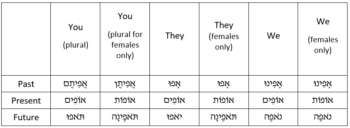
For example:
אֲנׅי מְאוֺד אוֺהֵב לֶאֱפוֹת. כֺּל יוֺם שׁׅישׁי אֲנׅי אוֹפֶה עוּגָה לׅכְבוֺד שַׁבָּת. אֲחוֹתִי גַּם אוֹפָה הַרְבֵּה, אֲבָל בְּעִיקָר עוּגִיּוֹת.
I love to bake. Every Friday I bake a cake for Shabbat. My sister also bakes a lot, but mostly cookies.
To prepare לְהָכִין
לְהָכִין (pronounced as le-a-chin) means to prepare. It’s a general verb that refers to almost anything. You can prepare your bag, a work of art, a new program, a trip track, etc. You can also prepare food. Since לְהָכִין is such a general verb, it can be used with any dish: cooked, fried, baked, hot or cold, it doesn’t matter.
The root of the verb לְהָכִין is כ-ו-נ, and it belongs to binyan hif’il. It’s conjugated as follows:

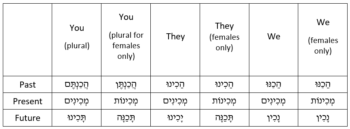
For example:
כָּל אֶחָד הֵכִין מַשֶּׁהוּ לְהַיּוֹם: אֲנׅי הֵכַנְתִּי אֶת הַסָּלָט, הֵם הֵכִינוּ אֶת הַפַּשְׁטִידָה, וְהׅיא הֵכִינָה אֶת הַקִנּוּחַ.
Everyone prepared something for today: I made the salad, they made the pie, and she made the dessert.
Keep Calm and Learn Hebrew

Build vocabulary, practice pronunciation, and more with Transparent Language Online. Available anytime, anywhere, on any device.



